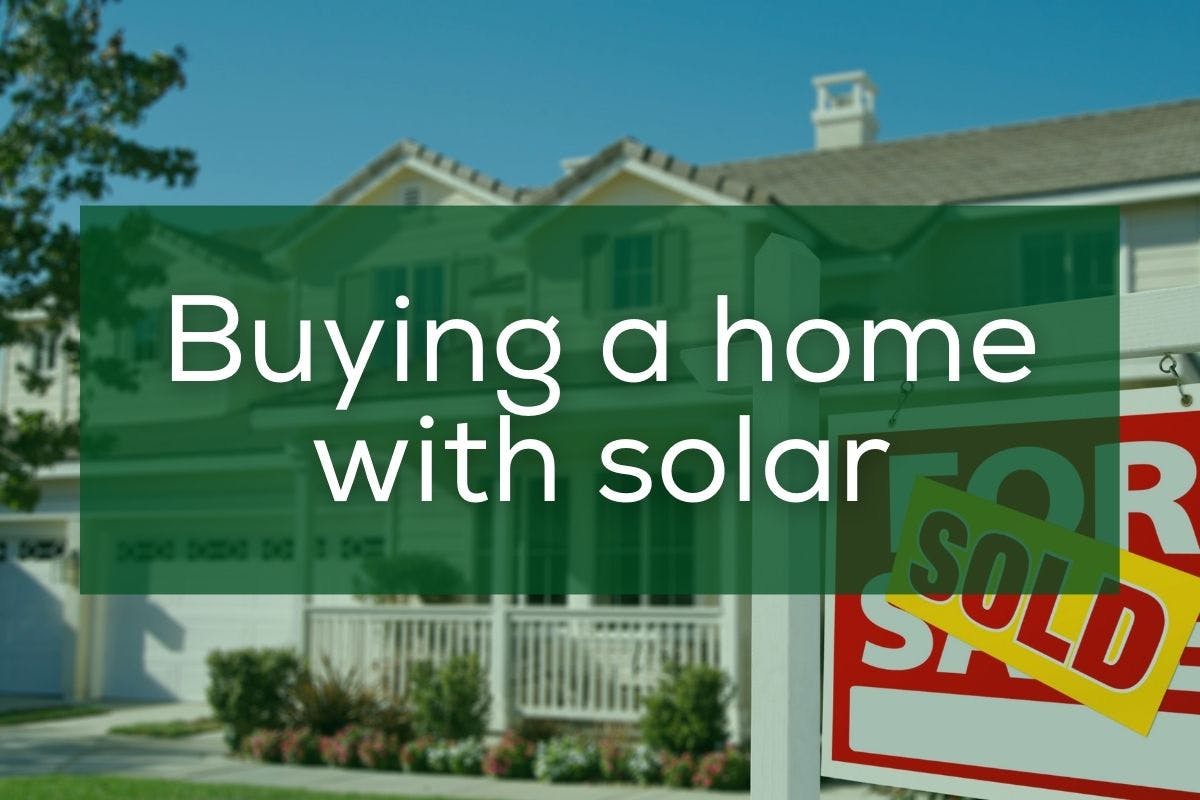If you are considering buying a home with solar panels already installed – but aren’t sure whether or not it is worth it – then you have come to the right place.
Truthfully, buying a house with solar panels is often worth it in the right set of circumstances. However, this is not always the case and many pieces of information must be discovered to make this important distinction.
As a complement to our guide on selling a house with solar panels, below, we will look at everything you need to know to decide whether buying a property with solar panels on it will be worth it for your particular set of circumstances.
10 Questions to Ask When Buying a House with Solar Panels
To uncover the true value of an existing set of solar panels, we recommend asking these 10 questions before you buy a home.
1. When were the solar panels installed?
Although some people will tell you that age is just a number, discovering the exact age of your future solar panels is very important to determine their present value. Today, most solar panels operate efficiently for 25 to 30 years, meaning that systems installed in the last 10 years or so may still have a long road of emission-free electricity production lying ahead. On the other hand, solar panels that have already been generating electricity for a few decades may no longer be as efficient and cost-saving as their younger selves.
2. What company installed the solar panels?
Besides the age of the system, the company that installed it is perhaps the most valuable piece of information you should have before deciding whether to buy a home with solar panels. If after just a small bit of research, you discover that the original installer has a bad reputation, you may be able to avoid issues the home seller is trying to escape. Of course, on the flip side of that, you may also be delighted to find that the homeowner is working with a five-star solar company like Palmetto.
3. Who can I contact with questions about the solar panels?
If the original company or contractor that installed your seller's solar panels is still in business at the moment, it should be relatively easy to find contact information for customer support. However, if the solar panels are “orphaned,” in that the original installer is no longer available for assistance, the home seller may have a new contact with an individual or business that can assist with the transition and help answer questions or handle future maintenance requests.
4. Are the solar panels purchased, leased, or something else?
Critically, knowing whether the current homeowners have chosen to buy or lease their solar panels is vital to determine if purchasing the home will be worth your investment. While the solar ownership model can directly increase home value and typically comes with very few ongoing payments, solar leases can complicate things if the terms of the agreement need to be transferred into your name. In both instances, you must determine how the current and future cash flow of the solar panels will affect your home’s expected finances.
5. Can I see all of the solar electricity production data so far?
In plain sight, it is impossible to tell whether or not solar panels are actively generating electricity, and taking the seller's word for it can be an unnecessary risk. To make sure that the system is performing as promised, ask the seller if it would be possible to see the electricity production data from what the solar panels have generated thus far. This information may come in two forms: past electricity bills or through digital solar monitoring software like the Palmetto App.
6. How much is your average electricity bill?
While offsetting carbon emissions is certainly a benefit, the ultimate goal of most solar buyers is to save money on electricity costs. If reduced electricity bills are a key selling point of the home you plan to purchase, the current owners should have no problem at all sharing their past electricity bills that reflect these solar savings. Seeing electricity bills can also help you prepare for the seasonality of solar panels so that you know what energy expenses to expect throughout the year.
7. What future expense can I expect (either monthly or one-time)?
In general, most residential solar energy systems require very little maintenance throughout their lifetime, which typically leads to very few post-purchase costs. With that said, most solar inverters will fail long before the lifetime of the panels has been realized, and when parts are working past their expected warranty periods, replacements can cost a sizable chunk of change. Conversely in a solar lease or power purchase agreement (PPA), you may inherit a monthly expense for your solar panels, but would likely not have to outlay additional costs for maintenance or inverter replacement.
8. Have you had any issues or maintenance performed on the system?
Speaking of maintenance, if you are buying a house with solar panels on it, be sure to ask the seller if anything has gone wrong with the system so far. While post-installation issues with solar panels are fairly rare, frequent losses in power output may be signs of larger problems. In the case that a part malfunctioned in the past but appears to be operating just fine in the present, any previous solar fixes shouldn't necessarily discount the value of a now-working system.
9. What should I expect at the end of the panels’ working lifetime?
Even though it may be over 20 years in the future, thinking about the end of your solar panels’ lifetime may also factor into your home-buying decision. At the end of a solar lease, you may have several choices to terminate, extend, or renew your agreement, as well as the possibility to “buy out” your equipment. On the other hand, if you purchase a home with solar panels that have been paid off (i.e. financed by the sellers), you will then want to verify if there are any costs associated with the eventual de-installation.
10. Is there anything else I should know about the system?
Finally, every solar panel installation is different, so do not be afraid to ask open-ended questions that can help determine if there is any additional information of which you should be aware. For instance, if you are in a dry area that accumulates dust fairly often, you may want to consult the seller on the best way to clean your solar panels and maintain efficiency.
Pros and Cons of Buying a House with Solar Panels
To simplify and summarize much of the information explored above, here's a look at the three most important pros and cons of buying a house with solar panels already installed.
| Pros | Cons |
|---|---|
| Lowered utility electric bills may be included as a home amenity | The price of a home with solar is generally more expensive upfront, given the value of the panels |
| Solar can help meet personal sustainability goals and lower carbon guilt while powering home lights and appliances | Homes with solar sell roughly 20% faster than homes without, making competition sometimes fierce |
| Solar panels help lower grid dependence and pair well with home batteries and EV chargers | Inheriting an unfavorable lease or shotty system can lead to additional expenses down the line |
Verdict: Should you buy a house with solar panels on it?
Ultimately, whether or not you should buy a house with solar panels on it will come down to several individual factors as they relate specifically to the property in question. Whereas paid-off solar panels or excellent lease terms can help save you money on electricity bills as soon as you move in, fully understanding how your panels work and what expenses to expect in the future are both essential before making your decision.
In talking with your realtor, the seller’s realtor, or the current property owners, running through the list of questions above will be a great way to facilitate an honest and educational conversation about how the solar panels will affect your investment.
If you are new to solar and would like to learn more, Palmetto is here to help answer all of your questions.
Visit our solar and clean energy resource library.
This content is for educational purposes only. Palmetto does not provide tax, legal, or accounting advice. Please consult your own tax, legal, and accounting advisors.

